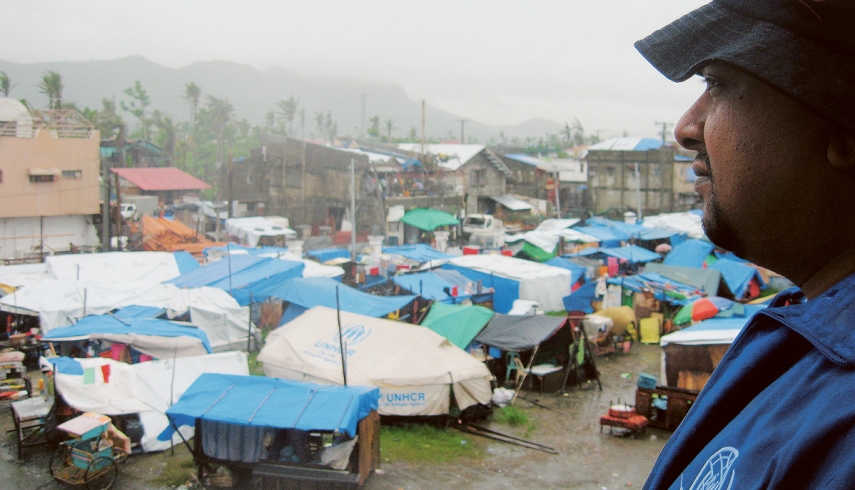Sunshine resident Dinesh Jayasuriya was watching the nightly news when he first heard of the powerful tropical cyclone dubbed Typhoon Haiyan that hit the Philippines in November last year, killing thousands of people.
It took him back to the Boxing Day Tsunami in 2004, which he narrowly escaped with his life.
“It was a significant turning point for me personally and is the main reason why I work in emergency humanitarian response,” Jayasuriya says.
The 38-year-old electrical engineer joined the North Melbourne-based disaster relief organisation RedR after seeing first-hand the devastation of the Indian Ocean earthquake and tsunami in 2004.
Jayasuriya was on holiday in Sri Lanka visiting family and friends. On Boxing Day morning he was scheduled to catch the first train to a beachside resort but missed it because a friend was late, and instead he caught the next train.
That first train was swallowed by the tsunami and almost everyone on board was killed, the death toll estimated at 1700 people.
Whether luck or divine fate, Jayasuriya still counts his blessings.
In the thick of the disaster he had wanted to assist in any way he could, but he didn’t know quite what to do.
When he returned to Australia he delved into the area of disaster response and came across RedR, an organisation that provides skilled professionals to UN agencies in humanitarian crises.
In subsequent years, Jayasuriya attended training courses then became a trainer himself before making the decision to become a humanitarian worker.
The typhoon that devastated the Philippines is his fourth humanitarian deployment.
“I heard about it on the news, but I was initially not planning to deploy because of my existing work commitments,” he says.
“I was working on my masters assignment on humanitarian law so the timing wasn’t ideal as deployment would, and has, meant failing the subject.
“Then a RedR Australia deployment co-ordinator approached me about the high demand for information management officers. Discussions with family and a Filipino associate convinced me that I should deploy.”
Jayasuriya arrived in the Philippines disaster zone late last year and will return to Australia later this month. He is working with about 16 fellow specialists as part of RedR’s support effort and says everyone involved develops a close bond as they strive to help those affected by the disaster.
His role entails tracking the needs of people left without homes and organising appropriate shelter and protection.
“For instance, identifying the most vulnerable people in the camps so that we can prioritise them when delivering aid – whether it be sufficient space or an adequate water supply or what they need to return home, such as materials to build a shelter.”
Jayasuriya says his experience dealing with the locals has been rewarding and a real eye-opener. He says the resilience of people has been astounding.
“From a more personal perspective, those I have met who are affected by the typhoon are happy, smiling and grateful, despite the real difficulties they face day to day,” Jayasuriya says.
“I came across a middle-aged man who is living in one of the evacuation centres in a school. His family is sharing a small room with four or five other families and their future is currently uncertain. He gave me a little business card-sized photo which shows the rubble that’s the remnants of his house. On it he has written: ‘With all its sham, drudgery & broken dreams, this is still a beautiful world’. I now carry the photo in my wallet to remind me why I am here.”
Jayasuriya says his biggest personal challenge on this deployment has been to remember how good he has it back home.
“During the long hours of work [14-hour days, seven days a week in the initial period], often difficult living conditions and the lack of contact with family and friends, sometimes it is difficult to remember why I am here. Then I meet a guy with a photo of rubble and I am motivated again.”
What is RedR?
RedR Australia is a humanitarian organisation which provides skilled people to international relief agencies in emergencies.
On permanent standby, RedR assists six United Nations and other frontline relief agencies, supplying support to global emergency response efforts.
People on RedR’s standby register undergo a rigorous selection and training process and are selected for their professional expertise and ability to work in challenging environments and cope with unfamiliar situations.
The register comprises experts from the fields of logistics, engineering, public health, emergency nutrition, social work and child protection, and humanitarian affairs.
RedR deployees are not volunteers and receive a salary and living allowance for the duration of their assignments, which vary from three months up to a year. RedR Australia currently has 32 specialists in 13 countries around the globe.








